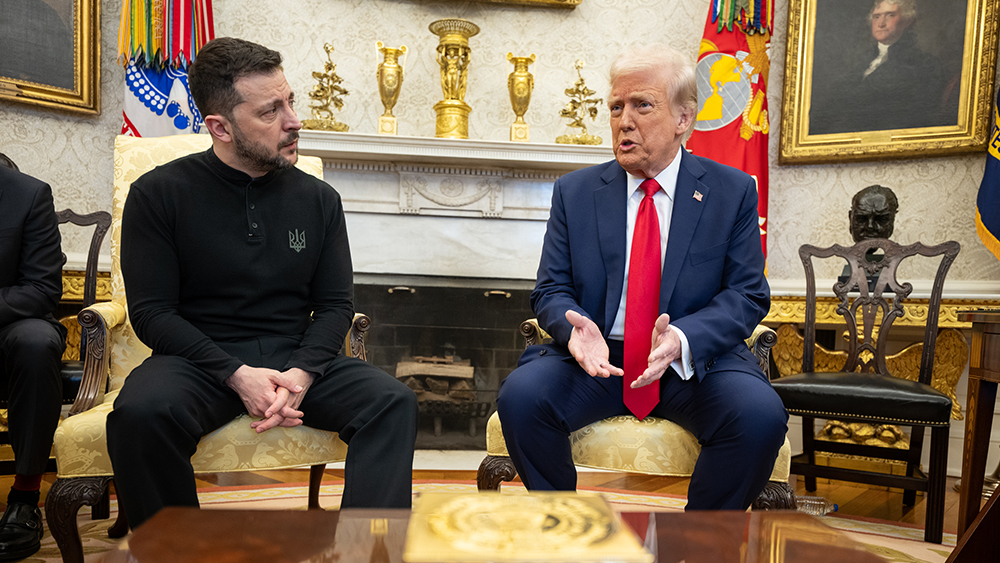 Parler
Parler Gab
Gab
- The Ukrainian Parliament unanimously approved a U.S. economic partnership, granting America 50% of revenues from Ukraine’s critical minerals, oil, gas, and infrastructure projects.
- The deal follows a heated February confrontation where Trump demanded repayment for U.S. aid, leading to a shouting match with Zelensky, who initially refused.
- A joint U.S.-Ukraine investment fund will split profits from mineral resources, although critics argue it lacks immediate security guarantees or military support for Ukraine.
- Trump’s push for direct repayment was dropped, but U.S. officials suggest future aid could be linked to Ukraine’s resource revenues.
- Zelensky’s shift from resistance to compromise reflects Ukraine’s urgent need for U.S. support amid dwindling Western aid and escalating Russian attacks.
A deal born from conflict
The path to ratification was anything but smooth. In February, Trump reportedly demanded Zelensky agree within an hour to surrender half of Ukraine’s resource revenues as repayment for U.S. assistance; Zelensky refused. The standoff escalated into a shouting match in the White House, with Trump berating Zelensky for lacking leverage. “You don’t have the cards right now,” Trump allegedly snapped. The breakdown stalled negotiations until April, when a chance meeting at Pope Francis’ funeral revived talks. Ukrainian officials, bypassing Zelensky’s team at one point, ultimately secured concessions, including the removal of Trump’s demand for direct aid repayment.What the deal includes
Under the agreement, the U.S. and Ukraine will co-manage a Reconstruction Investment Fund, with equal governance rights. “Neither side has an advantage, there is no dictatorship from either side, and decisions are taken by consensus,” said Ukraine’s First Deputy Prime Minister Yulia Svyrydenko. The fund will channel revenues from new mineral extraction licenses, though specifics on governance remain vague. U.S. Treasury Secretary Scott Bessent framed the deal as a strategic win, telling the Milken Institute it creates “leverage” against Russia and reassures Ukrainians of America’s commitment. Yet skeptics note the pact lacks binding security guarantees or immediate weapons deliveries, despite Ukraine’s desperate need for Patriot air defenses.Repaying the debt?
Trump has long argued that Ukraine owes the U.S. for its generosity. While the final deal avoids labeling past aid as a debt, Bessent hinted that future assistance could be tied to mineral profits. “It would be a symbol to a tired American public, skeptical of more financial commitments, that it was possible to have shared prosperity with Ukraine,” he said. For Kyiv, the agreement is a pragmatic compromise. With Western aid dwindling and Russian forces intensifying attacks, Ukraine’s leadership saw resource-sharing as the price for sustained U.S. backing. Yet the deal’s long-term payoff is uncertain: analysts warn mineral extraction could take a decade to yield significant returns.Zelensky’s gamble
Zelensky’s initial resistance to Trump’s demands nearly derailed the partnership. His refusal to sign an earlier draft that lacked protections for Ukrainian sovereignty drew accusations of ingratitude from Trump. But by April, facing battlefield setbacks and stalled ceasefire talks, Zelensky softened his stance. The U.S.-Ukraine minerals deal is a hard-won compromise, born from clashing egos and geopolitical necessity. While it offers Kyiv a lifeline, it also underscores the precariousness of relying on foreign patronage. For Americans weary of open-ended aid, the promise of repayment, however distant, may be the only solace. As Bessent put it: “Sometimes with a blow-up, you wind up with a better deal.” Whether that’s true for Ukraine, or just for Trump, will depend on what comes next. Sources for this article include: InfoWars.com MSN.com Reuters.com APNews.com NYPost.comBy Lance D Johnson // Share
U.S. and China agree to slash tariffs in 90-day trade war truce
By Cassie B. // Share
Zelensky and Putin set for high-stakes Turkey talks after Trump’s ceasefire push
By Cassie B. // Share
Fragile India-Pakistan ceasefire holds as world fears another flare-up
By Cassie B. // Share
AI breakthrough Aardvark Weather offers affordable forecasting for globally vulnerable regions
By Willow Tohi // Share
Governments continue to obscure COVID-19 vaccine data amid rising concerns over excess deaths
By patricklewis // Share
Tech giant Microsoft backs EXTINCTION with its support of carbon capture programs
By ramontomeydw // Share
Germany to resume arms exports to Israel despite repeated ceasefire violations
By isabelle // Share










